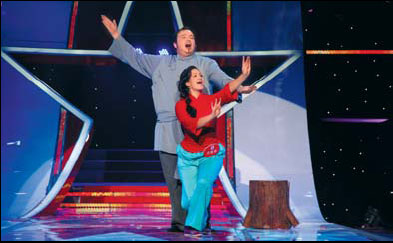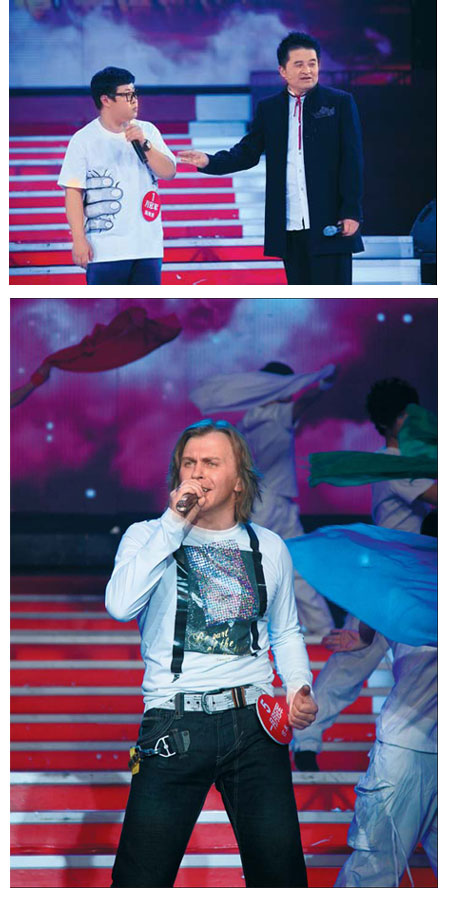Avenue of stars
Updated: 2012-01-01 08:17
By Sun Li(China Daily)
|
|||||||||
|
American Paul Just and Canadian Chloe Hurst were the latest foreign artistes who have taken to the Chinese stage. They sang an excerpt from the popular revolutionary opera White-Haired Girl to earn a place in the Star Way finals. Provided to China Daily |
|
Top: Star Way host Bi Fujian's trademark banter with contestants keeps the audiences amused. Above: Ukranian Ji Mi adds that exotic appeal to the stage that Bi is looking for. Provided to China Daily |
China has a huge talent pool, and among this shimmering galaxy, there are now some unusual glitter attracting attention. These are the lao wai artistes, foreigners who come to China in search of fame, if not fortune. Sun Li talks to one man who has seen them come and go at close quarters.
His entry on stage is always dramatic. He strolls down the red-carpeted stairs on stage and drawls: "Erhhhh ... Welcome to the Avenue of Stars!" That is Bi Fujian's cue for enthusiastic applause among the audience, some of whom have followed his wildly popular grassroots talent quest for all of its seven years. Xingguang Dadao, or Star Way, is one of China national television CCTV's most popular programs, with sky-high ratings that have kept it on air since its debut in 2005. It offers a channel for grassroots talent to showcase their songs, dances and other unusual skills and it also provides a platform where foreign contestants get a fighting chance at fame.
Bi welcomes them to his show, as he believes they exude exotic appeal that keeps his audiences interested. He admits he has lost count of how many have appeared on Star Way, but he still remembers the first time his producers told him a foreign contestant would appear on his stage during the show's inaugural season.
"I was astonished," Bi says. "Star Way was designed to be a program for the common folks to show off their talent and have fun. Having a foreign contestant was way beyond my expectation.
"The first foreign contestant was Cheng Xi, an Austrian student studying in China. She won the audience with her stunning martial arts performances and sweet renditions of Chinese folk songs," Bi recalls. "I knew the foreigners who managed to get through to CCTV must have something up their sleeves, but I was still surprised at how well they performed," Bi says, adding that the next foreign face after Cheng Xi was Emmanuel Uwechue, better known as Hao Ge, a Nigerian singer known for his soul-infused versions of classical Chinese songs.
"After Hao Ge rose to stardom in Star Way, many other foreigners applied to our show hoping to strut their stuff," Bi says. The veteran TV host says these foreign talent means a lot to his show. They bring novelty to the show.
"Think about it. People with different skin color, with different mother tongues ... they sing in Mandarin and they sing very well. Isn't it phenomenal? Episodes featuring foreign contestants always score high ratings."
Bi thinks this new trend of foreign contestants singing Chinese songs helps promote our culture abroad and enhances his program's international appeal.
No wonder the production team has always been keen to identify foreign artists.
Even though more than a dozen foreign performers have breezed their way through Star Way and on to fame through the years, the novelty has not worn off.
"If you say audiences are no longer as surprised as when they saw Cheng Xi or Hao Ge on stage, I agree," Bi says. "People who break new ground are always more impressive. We don't have foreign contestants in every episode."
Although the show receives more than its share of foreign applicants, many are eliminated in the preliminary interviews.
"Compared with their Chinese counterparts, foreigners are a rarity. But being rare does not mean better. Many foreign applicants are just run-of-the-mill and the program will always put the performance before novelty value.
"We have foreigners performing hip-hop and xiangsheng or crosstalk. Even in singing, they can bring to the program a very different style."
Bi cites the examples of Ji Mi, a Ukrainian, Hao Ge's brother Hao Di and this year's Yang Zuhe (Foreign Pair), the singing duo of Canadian Chloe Hurst and American Paul Just.
"While Ji Mi blew audiences away with his Peking Opera pieces and Hao Di rocked the stage with his passionate renditions of Chinese patriotic songs, this year's Yang Zuhe wowed everyone with their performance of the iconic revolutionary opera White-haired Girl."
Hurst and Just finished their competition off with a superb rendition of I Love China to snatch the title of the month's champion. They will now join winners of the other 11 months in competing for the final prize during the coming Spring Festival.
Bi is known for his lively interaction with contestants, and his laconic comments and versatile talents have made him the undisputed celebrity of the show.
He is a quick-witted host known for speaking off the cuff and he says he often pops unexpected questions that catch contestants off guard.
"Many foreigners sing Chinese songs well, but their spoken Chinese is not that good," Bi says. "Sometimes I used my lousy English to respond to their average Chinese." That is guaranteed to crack the audience up.
While he often toys with Chinese contestants on the program, foreigners can turn the tables on him, Bi says. For example, Yang Zuhe's Chloe Hurst told him they were relatives, which puzzled him initially, until Hurst told him she was a "lao wai" and he was "lao Bi".
"Such innovative responses from the foreigners make them very likable," Bi says.
He adds that non-Chinese contestants are not given any brownie points just because they come from a faraway country. They are judged like the rest of the contestants.
"To ensure a fair game, no participant knows who will serve as the judges until they see the jury members at the scene," Bi says.
"Chinese and foreign contestants are met with the same standards," and Bi says the only tricky part is when a Chinese contestant and a foreign competitor both give equally good performances.
"When that happens, the judges may give the foreigner the edge as they take into account the language handicap."
Several Star Way winners such as Hao Ge and Ji Mi have built a large fan base in China and made their names known, but Bi acknowledges that not every foreign winner gets to that.
"Some foreigners, just like the Chinese, come to the show to have fun," Bi says. "They do not consider performing their career. Whether they follow up on their success, or if they choose to fade away from the public eye, that's their choice."
In time, Bi admits, his audience may be tired of yet another foreign face on the show, but right now it is not happening and he does not have to worry about it.
"I'll figure out how to cope with that in due time."
In the meantime, as long as foreign contestants still have lots of fun experimenting with the vast variety of Chinese song and dance, Bi's audience will still have lots of fun watching them along the avenue of stars. Don't switch channels.
(China Daily 01/01/2012 page1)

